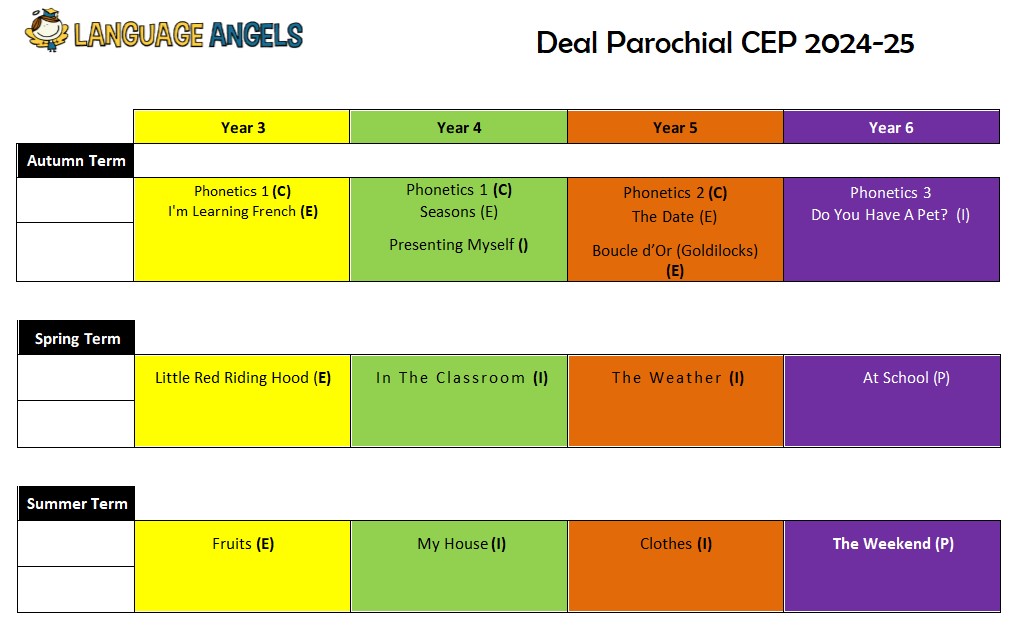
Learning a foreign language helps children develop an appreciation of other cultures and deepens their understanding of the world. At Deal Parochial CEP School we aim to enable pupils to express their ideas and thoughts in another language and to understand and respond both in speech and in writing.
At Deal Parochial CEP the Foreign Language we study is French. Although the national curriculum only requires the subject be taught from Year 3 onwards we recognise the importance of encouraging a love of languages from the start of school, so pupils will be exposed to French, and other languages from Reception. A key purpose of including a European dimension in education is to develop pupils understanding of cultural diversity, and to refine their attitudes and perceptions about other countries, particularly one so close to us. Above all, we aim to provide opportunities for our pupils to communicate for practical purposes, so that they can use these skills within real-life situations.
Intention
At Deal Parochial, we intend to use the Language Angels scheme of work and resources to ensure we offer a relevant, broad, vibrant and ambitious foreign languages curriculum that will inspire and excite our pupils using a wide variety of topics and themes. All pupils will be expected to achieve their full potential by encouraging high expectations and excellent standards in their foreign language learning - the ultimate aim being that pupils will feel willing and able to continue studying languages beyond key stage 2.
The intent is that all content will be continuously updated and reviewed annually, creating a dynamic programme of study that will be clearly outlined in both long-term and short-term planning. This will ensure that the foreign language knowledge of our pupils progresses within each academic year and is extended year upon year throughout the primary phase and, in so doing, will always be relevant and in line with meeting or exceeding national DfE requirements.
The four key language learning skills; listening, speaking, reading and writing will be taught and all necessary grammar (including French phonics) will be covered in an age-appropriate way across the primary phase. This will enable pupils to use and apply their learning in a variety of contexts, laying down solid foundations for future language learning and also helping the children improve overall attainment in other subject areas.
The intent is that all pupils will develop a genuine interest and positive curiosity about foreign languages, finding them enjoyable and stimulating. Learning a second language will also offer pupils the opportunity to explore relationships between language and identity, develop a deeper understanding of other cultures and the world around them with a better awareness of self, others and cultural differences. They will enjoy exploring the commonality between the languages and make links with root words, enhancing their understanding of the English language. We will use the same grammatical vocabulary, eg. noun, verb, adjective, determiner, to enhance and support their English. The intention is that they will be working towards becoming life-long language learners and will be taught ways of remembering new words that will be transferable across all areas of their learning.
Implementation
All classes will have access to a very high-quality foreign languages curriculum using the Language Angels scheme of work and resources. This will progressively develop pupil skills in foreign languages through regularly taught and well-planned weekly lessons in KS2.
Children will progressively acquire, use and apply a growing bank of vocabulary, language skills and grammatical knowledge organised around age-appropriate topics and themes - building blocks of language into more complex, fluent and authentic language.
In addition, the children will be taught how to look up and research language they are unsure of using bilingual dictionaries.
The planning of different levels of challenge (as demonstrated in the various Language Angels Teaching Type categories) and which units to teach at each stage of the academic year will be be reviewed in detail annually as units are updated and added to the scheme. Lessons offering appropriate levels of challenge and stretch will be taught at all times to ensure pupils learn effectively, continuously building their knowledge of and enthusiasm for the language they are learning.
Impact
The teaching structure of Language Angels units is designed to ensure students progress steadily in their language learning journey, with each unit building on the previous one. As students move from Early Learning to Intermediate, and finally to Progressive units, they are challenged with increasing levels of linguistic complexity, enabling them to develop stronger language skills. Early Learning units focus on basic words and simple phrases, while Progressive units encourage students to engage with longer texts and more advanced sentence structures, fostering their ability to communicate more confidently and creatively in the language.
This progressive approach ensures that students don't just learn isolated facts, but continuously build on their existing knowledge, allowing them to gain a deeper understanding and greater fluency in the language. The skills they develop—from basic vocabulary to more complex grammar and sentence construction—are directly linked to their ability to express ideas, opinions, and personal thoughts in the target language.
The impact of this approach is that, as students advance, they are not only learning a new language but also enhancing their cognitive skills, including problem-solving, memory, and critical thinking. They are encouraged to think and express themselves more flexibly, which has broader benefits for their overall learning development.
At the end of each 6-week unit, students are assessed on their progress in speaking, listening, reading, and writing, ensuring they are mastering essential language skills. Teachers use this data to target instruction more effectively, tailoring lessons to meet the needs of each student and providing detailed feedback to both students and parents. The clear learning objectives, regular assessments, and progress tracking tools help students see how far they’ve come, reinforcing the real-world value and long-term benefits of their language learning.





